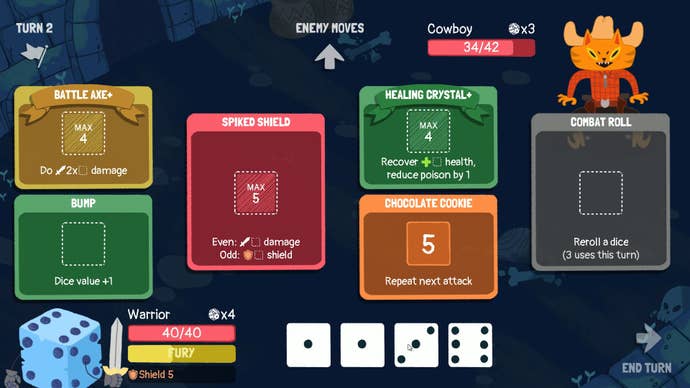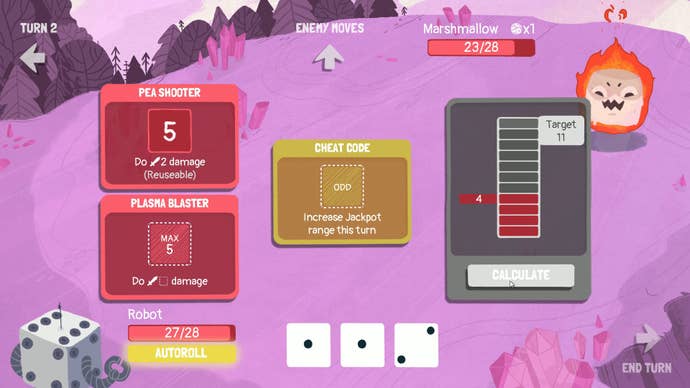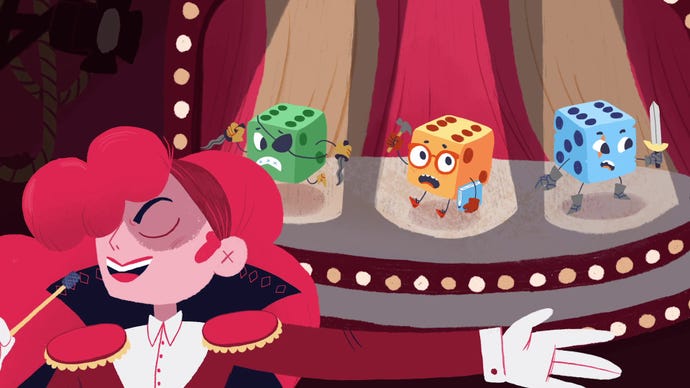Dicey Dungeons Review
Down in this dungeon, survival is just a roll of the die.
This article first appeared on USgamer, a partner publication of VG247. Some content, such as this article, has been migrated to VG247 for posterity after USgamer's closure - but it has not been edited or further vetted by the VG247 team.
Dice were the core of Dungeons and Dragons, the original role-playing game, the granddaddy of the entire RPG genre. Dicey Dungeons, the latest game from Super Hexagon and VVVVVV designer Terry Cavanagh, dice are back at the forefront. Cavanagh is known for minimalism and stripping games down to their most functional parts. Dicey Dungeons is doing that for RPGs, while at the same probably being Cavanagh's most lavish visual presentation yet.
In Dicey Dungeons, there's an odd recursive loop where you are living dice that also use dice. Each die is a contestant in a gameshow hosted by Lady Luck, the Goddess of Fortune. You'll wander through simple dungeons fighting monsters, unlocking treasure chests, and upgrading your skills. There's no real exploration; you can see all the paths in front of you on every floor, and the dungeons themselves are only six floors deep.
Instead, Dicey Dungeons is all about your luck and ability to roll with the situation. The combat is turn-based and each round, you'll roll a certain number of dice that fuel your abilities. You have six different characters to play as: Warrior, Thief, Witch, Robot, Inventor, and Jester.
Each character has their own unique skills and way of using the dice. The Warrior is straight, using the dice to defend and attack. The Thief can manipulate its dice, breaking them apart or bumping their strength up by one, in addition to stealing one of their current enemy's skills. While everyone else rolls a certain number of dice depending on their current level, The Robot has a CPU meter that summons as many dice as possible, as long as you stay underneath a total maximum. The Jester doesn't have set skills at all, instead drawing skill cards at random; even more chaos on top of the dice rolls.
For better or worse, Dicey Dungeons is glaringly simple. Did the dice rolls go in your favor? Did you upgrade or draw the right skills to proceed? On one hand, this makes it very easy to get into, as the rules are strict and dice are a simple concept. On the other, it doesn't feel as "meaty," lacking the depth some might be looking for.

Every enemy offers a unique skillset and weakness, and bosses offer an additional tweak, like a special skill that's needed to dispatch them. Take the vampire who can only be killed with a Wooden Stake skill, which requires dice totalling 40 to activate. This means you have to balance using your assorted dice to attack and defend yourself, while also charging the Wooden Stake. Dicey Dungeons gives you a ruleset and asks you to triumph within those boundaries.
Each character has six different dungeons, each with a different ruleset. (Or they're supposed to. Some of the characters are missing one or two dungeon sets.) If you pick the Witch for example, the first dungeon uses the standard ruleset where you use dice to summon spells from a spellbook. Another gives you a random spell in your spellbook each round, while a later one makes the first roll always a six, the next a five, and so on.
The dungeons are simply puzzles to overcome, where if you hack away at it long enough, you'll likely win. Eventually, the random number god will roll in your favor. Nothing carries over from dungeon to dungeon, or character to character. The dungeons themselves are procedurally generated, so they're different each time, but there's not enough different that you'd see them as a new experience. Combat is a lot of fun, but Dicey Dungeons honestly feels a little light overall.
In terms of longevity, Dicey Dungeons' release iteration finally offers some in the form of unlocking further characters and episodes. You begin with the Warrior, while further contestants come after you've dove into the dungeon. There's also new Remix and Challenge modes if you're really vibing with game. It's something, but I wanted more of a sense of progression than Dicey Dungeons offered. Maybe more of a story, more exploration, or the ability to carry over item from dungeon to dungeon. As it stands, it's the kind of game that I'd load up on a mobile device for a few minutes of fun each session, not the more in-depth experience I tend to play on my desktop.

That's a shame, because as I said before, the presentation of Dicey Dungeons is top-notch. It has fantastic, totally charming hand-drawn artwork from Marlowe Dobbe. It's all simple animations, but all of the characters and monsters feel like they've come to life out of a pop-up storybook. And composer Chipzel, who worked with Cavanagh on Super Hexagon, turns out an upbeat electronic soundtrack; I'd probably have gone with something a little whimsical, but I was jamming right along as I was playing.
Dicey Dungeons is an enjoyable diversion, neither as tense or immediately gripping as Cavanaugh's earlier Super Hexagon. It's good, but I'd say it didn't grab me more after my early hours of playtime. It's a light, fun RPG that won't stress you out. Dicey Dungeons feels like a game that's perfectly suited for a train ride or other commute. If that's your poison, you should pick up your six-sided die and try to take down Lady Luck.
ConclusionThe charming dungeon crawler builds itself around the chaos of dice. Choose one of six characters, each with their own unique skills and way utilize your rolls of the six-sided die. Combat is rather fun, the artwork feels like a pop-up book, and the electronic soundtrack will have you tapping your foot. Despite the characters and additional modes though, it doesn't feel like Dicey Dungeons expands upon its early hours of play enough. Still, it's an enjoyable roguelite dungeon crawler.


